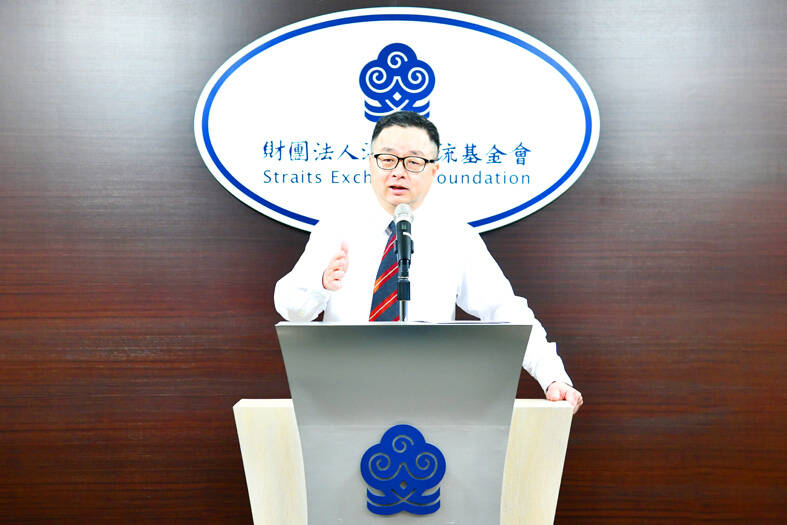More than 25 percent of China-based Taiwanese businesses are considering terminating their operations in China, with 50 percent looking to increase investments into non-Chinese supply chains, given the US’ tariffs, Straits Exchange Foundation (SEF) Secretary-General Luo Wen-jia (羅文嘉) said on Friday.
US President Donald Trump on April 2 imposed a 32 percent tariff on imports from Taiwan, but one week later announced a 90-day pause on its implementation. However, a universal 10 percent tariff was immediately applied to most imports from around the world.
On April 12, the Trump administration exempted computers, smartphones and semiconductors from the new tariffs.

Photo courtesy of the Straits Exchange Foundation
Taiwanese businesses most affected by the situation are those with operations in China that primarily export their products to the US and have low gross profit margins, Luo said.
Companies that cater to China’s domestic market are the second-most affected, Luo added.
US tariffs have significantly affected the imports of materials and components for China’s domestic markets. As a result, products that were previously stored are now being sold domestically, increasing competition, he said.
Although electronics, information technology (IT) products and semiconductors are less affected, the Mainland Affairs Council urged business owners to wait and see how the Chinese market reacts, Luo said.
The consensus among Taiwanese businesses in response to the short-term uncertainty brought about by US tariff policies is to increase investment in non-Chinese supply chains, and bolster the resilience of regional supply chains to weather the effects of the changes in the international economic order and geopolitical shifts, Luo said.
The SEF also reminded Taiwanese businesses to be careful of investment risks, he said.
Meanwhile, in view of the coming summer break for students, Luo said that travelers to China should be wary of youth start-up assistance groups and youth culture interaction groups.
They could be a cover for scam groups, he said, citing as an example an incident in which the Chinese Youth Entrepreneurs Association used identification documents from tour group members to apply for loans for Sichuan’s youth start-up zone, he said.
Culture interactive groups could be a front for cheap tour groups or groups that focus on political propaganda and “united front” rhetoric, Luo said.
The number of people who are missing due to those reasons varies, but even one missing person shows that there is a risk of “disappearing” when traveling to China, he said.
The SEF would publicize those cases while maintaining the anonymity of the people affected to promote greater awareness of the risks associated with traveling to China, he added.

The manufacture of the remaining 28 M1A2T Abrams tanks Taiwan purchased from the US has recently been completed, and they are expected to be delivered within the next one to two months, a source said yesterday. The Ministry of National Defense is arranging cargo ships to transport the tanks to Taiwan as soon as possible, said the source, who is familiar with the matter. The estimated arrival time ranges from late this month to early next month, the source said. The 28 Abrams tanks make up the third and final batch of a total of 108 tanks, valued at about NT$40.5 billion

Two Taiwanese prosecutors were questioned by Chinese security personnel at their hotel during a trip to China’s Henan Province this month, the Mainland Affairs Council (MAC) said yesterday. The officers had personal information on the prosecutors, including “when they were assigned to their posts, their work locations and job titles,” MAC Deputy Minister and spokesman Liang Wen-chieh (梁文傑) said. On top of asking about their agencies and positions, the officers also questioned the prosecutors about the Cross-Strait Joint Crime-Fighting and Judicial Mutual Assistance Agreement, a pact that serves as the framework for Taiwan-China cooperation on combating crime and providing judicial assistance, Liang

A group from the Taiwanese Designers in Australia association yesterday represented Taiwan at the Midsumma Pride March in Melbourne. The march, held in the St. Kilda suburb, is the city’s largest LGBTQIA+ parade and the flagship event of the annual Midsumma Festival. It attracted more than 45,000 spectators who supported the 400 groups and 10,000 marchers that participated this year, the association said. Taiwanese Designers said they organized a team to march for Taiwan this year, joining politicians, government agencies, professionals and community organizations in showing support for LGBTQIA+ people and diverse communities. As the first country in Asia to legalize same-sex

MOTIVES QUESTIONED The PLA considers Xi’s policies toward Taiwan to be driven by personal considerations rather than military assessment, the Epoch Times reports Chinese President Xi Jinping’s (習近平) latest purge of the Chinese People’s Liberation Army (PLA) leadership might have been prompted by the military’s opposition to plans of invading Taiwan, the Epoch Times said. The Chinese military opposes waging war against Taiwan by a large consensus, putting it at odds with Xi’s vision, the Falun Gong-affiliated daily said in a report on Thursday, citing anonymous sources with insight into the PLA’s inner workings. The opposition is not the opinion of a few generals, but a widely shared view among the PLA cadre, the Epoch Times cited them as saying. “Chinese forces know full well that